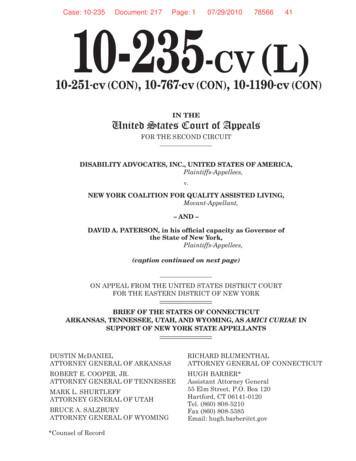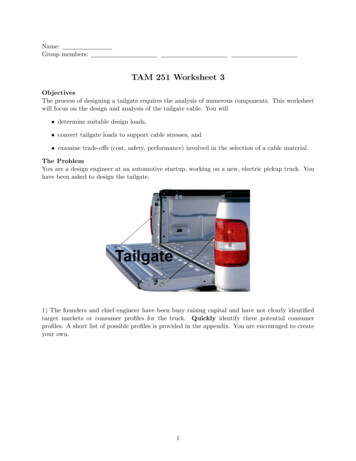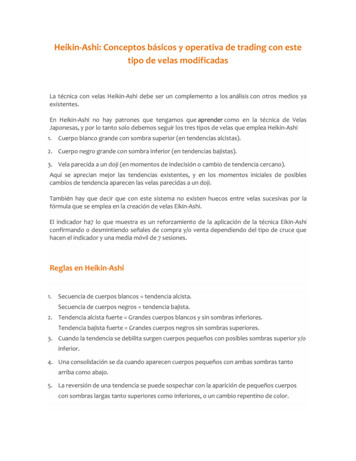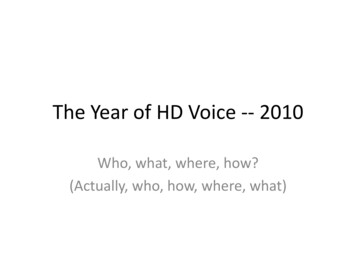
Transcription
Case: 10-235Document: 217Page: 107/29/2010785664110-235-CV (L)10-251-cv (CON), 10-767-cv (CON), 10-1190-cv (CON)IN THEUnited States Court of AppealsFOR THE SECOND CIRCUITDISABILITY ADVOCATES, INC., UNITED STATES OF AMERICA,Plaintiffs-Appellees,v.NEW YORK COALITION FOR QUALITY ASSISTED LIVING,Movant-Appellant,– AND –DAVID A. PATERSON, in his official capacity as Governor ofthe State of New York,Plaintiffs-Appellees,(caption continued on next page)ON APPEAL FROM THE UNITED STATES DISTRICT COURTFOR THE EASTERN DISTRICT OF NEW YORKBRIEF OF THE STATES OF CONNECTICUTARKANSAS, TENNESSEE, UTAH, AND WYOMING, AS AMICI CURIAE INSUPPORT OF NEW YORK STATE APPELLANTSDUSTIN McDANIELATTORNEY GENERAL OF ARKANSASRICHARD BLUMENTHALATTORNEY GENERAL OF CONNECTICUTROBERT E. COOPER, JR.ATTORNEY GENERAL OF TENNESSEEHUGH BARBER*Assistant Attorney General55 Elm Street, P.O. Box 120Hartford, CT 06141-0120Tel. (860) 808-5210Fax (860) 808-5385Email: hugh.barber@ct.govMARK L. SHURTLEFFATTORNEY GENERAL OF UTAHBRUCE A. SALZBURYATTORNEY GENERAL OF WYOMING*Counsel of Record
Case: 10-235Document: 217Page: 207/29/20107856641(caption continued from front cover)EMPIRE STATE ASSOCIATION OF ASSISTED LIVING,Movant-Appellant,RICHARD F. DAINES, in his official capacity as Commissioner ofthe New York State Department of Health, MICHAEL F. HOGAN, inhis official capacity as Commissioner of the New York StateDepartment of Mental Health, NEW YORK STATE DEPARTMENT OFHEALTH, NEW YORK STATE OFFICE OF MENTAL HEALTH,Defendants-Appellants,
Case: 10-235Document: 217Page: 307/29/20107856641TABLE OF CONTENTSTABLE OF AUTHORITIES. iiINTEREST OF THE AMICI STATES. 1STATEMENT OF THE FACTS AND PROCEEDINGS. 4ARGUMENT. 12I.THERE IS NO PROPER BASIS FOR RELIEF AGAINST THEGOVERNOR, DOH, OR THE DOH COMMISSIONER .12II. PLAINTIFF LACKS STANDING TO ASSERT THE CLAIMS RAISEDIN THIS ACTION .14III.PLAINTIFF’S CONSTITUENTS DID NOT RECEIVE GOVERNMENTALSERVICES, PROGRAMS, OR ACTIVITIES THAT WERE PROVIDEDIN A DISCRIMINATORY MANNER .22IV. THE ORDER BELOW INAPPROPRIATELY INTRUDES ON THEAUTHORITY OF THE STATE TO DESIGN PROGRAMS, SETELIGIBILITY STANDARDS, AND ASSESS CLIENT ELIGIBILITYFOR COMMUNITY-BASED PROGRAMS ULITIZING ITS OWNTREATMENT PROFESSIONALS .29V.THE RELIEF ORDERED BELOW WILL WORK A “FUNDAMENTALALTERATION” .31CONCLUSION. 32i
Case: 10-235Document: 217Page: 407/29/20107856641TABLE OF AUTHORITIESCasesAlexander v. Choate, 469 U.S. 287 (1985). 2, 20, 27, 28American Legal Foundation v. FCC, 808 F.2d 84 (D.C. Cir. 1987) 16Assoc. for Retarded Citizens v. Dallas County Mental Health &Mental Retardation Ctr. Bd. of Trustees, 19 F.3d 241 (5th Cir.1994) . 16, 17nBrown v. Stone, 66 F. Supp. 2d 412 (E.D.N.Y. 1999). 14Community for Creative Non-Violence v. Pierce, 814 F.2d 663(D.C. Cir. 1987). . 14Connecticut Dep’t of Income Maintenance v. Heckler, 471 U.S.524 (1985) . 7nDahlberg v. Becker, 748 F.2d 85 (2d Cir. 1984). 13Doe v. Pfrommer, 148 F.3d 73 (2d Cir. 1998). 2, 19, 20Doe v. Stincer, 175 F.3d 879 (11th Cir. 1999). 17nDuchesne v. Sugarman, 566 F.2d 817 (2d Cir. 1977). 12Ex parte Young, 209 U.S. 123 (1908). 13Fisher v. Oklahoma Health Care Auth., 335 F.3d 1175 (10th Cir.2003) . 29Fleming v. New York University, 865 F.2d 478 (2d Cir. 1989). 21Henrietta D. v. Bloomberg, 331 F.3d 261 (2d Cir. 2003) 26, 29, 30Hope, Inc. v. County of Du Page, 738 F.2d 797 (7th Cir. 1984). 16Hunt v. Washington State Apple Adver. Group, 432 U.S.333 (1977) . 15, 16, 16n, 17nInnovative Health Sys. v. City of White Plains, 117 F.3d 37 (2dCir. 1997) . 25nJudicial Watch, Inc. v. United States Senate, 340 F. Supp. 2d 26(D. D.C. 2004) . 17ii
Case: 10-235Document: 217Page: 507/29/20107856641Klostermann v. Cuomo, 126 Misc. 2d 247, 481 N.Y.S.2d 580(N.Y. Sup. Ct. 1984) . 24, 26Leocata v. Leavitt, 148 Fed. Appx. 64 (2d Cir. 2005). 2, 27Lujan v. Defenders of Wildlife, 504 U.S. 555 (1992). 12, 18Martin v. Taft, 222 F. Supp. 2d 940 (S.D. Ohio 2002). 22, 29Messier v. Southbury Training Sch., 1999 U.S. Dist.LEXIS 1479 (D. Conn. Jan. 5, 1999). . 13, 13n, 22, 29Mo. Prot. & Advocacy Servs. v. Carnahan, 499 F.3d 803(8th Cir. 2007) . 16, 17nO’Bannon v. Town Court Nursing Center, 447 U.S. 773 (1980) 13, 26Olmstead v. L.C. by Zimring, 527 U.S. 581 (1999). passimOregon Advocacy Ctr. v. Mink, 322 F.3d 1101 (9th Cir. 2003). 17nPeople Organized for Welfare & Employment Rights v. Thompson,727 F.2d 167 (7th Cir. 1984) . 16Rizzo v. Goode, 423 U.S. 362 (1976). 13Rodriguez v. City of New York, 197 F.3d 611 (2d Cir. 1999) passimScherman v. New York State Banking Dep’t, 2010 U.S. Dist. LEXIS26288 (S.D.N.Y. Mar. 19, 2010) . 26Simon v. Eastern Kentucky Welfare Rights Organization, 426 U.S.26 (1976). . 18State Office of Prot. & Advocacy for Persons with Disabilitiesv. Connecticut, 2010 U.S. Dist. LEXIS 31601 (D. Conn. Mar. 31,2010) . 4, 28Town of Castle Rock v. Gonzales, 545 U.S. 748 (2005). 13, 26Traynor v. Turnage, 485 U.S. 535 (1988). 27United Food & Commer. Workers Union Local 751 v. Brown Group,517 U.S. 544 (1996) . 17Valley Forge Christian College v. Americans United forSeparation of Church & State, 454 U.S. 464 (1982) . 12, 18iii
Case: 10-235Document: 217Page: 607/29/20107856641Vinson v. Thomas, 288 F.3d 1145 (9th Cir. 2002). 21Warth v. Seldin, 422 U.S. 490 (1975). 16Weisshaus v. Swiss Bankers Ass'n (In re Holocaust Victim AssetsLitig.), 225 F.3d 191 (2d Cir. 2000) . 17nWhitmore v. Arkansas, 495 U.S. 149 (1990). 14Zimmerman v. Oregon DOJ, 170 F.3d 1169 (9th Cir. 1999). 25n, 26Federal §§§§1396n(c). 2, 7n1396r(e)(7). 2810805. 15, 17n12131(2). 2512132. 19, 24, 26New York State �§5.07. 8, 237.07. 8, 2341.03. 841.39. 841.42. 8Federal Regulations28 C.F.R. § 35.130(d). 2, 24, 25, 2942 C.F.R. § 483.116. 2842 C.F.R. § 483.120.28New York State Regulations18 NYCRR § 485.2(b). 418 NYCRR § 487.2(a). 4iv
Case: 10-235Document: 217Page: 707/29/20107856641INTEREST OF THE AMICI nessee,respective Attorneys rThe amici states provide a theirsatisfyfinancial and other eligibility requirements frequently qualifyfor “entitlement” programs, such as Medicaid and Food Stamps,which are generally available to all needy, “disabled” etypicallyadministered by “state welfare” or “state Medicaid” agencies.In addition, the states administer programs and services throughdesignated state mental health agencies that are targeted formentally ill individuals.The states are fully committed to providing community-basedmental health care, whenever feasible.However, any state’sability to assist is limited by the practical need to meet theeducational, public health, and public safety needs of all ofits residents, and the need to maintain the economic vitality Accordingly, no state provides state-administered mental healthservice to its citizens as open-ended entitlements.The Americans with Disabilities Act (“ADA”) and § 504 ofthe Rehabilitation Act forbid discrimination on the basis of1
Case: 10-235Document: 217Page: 807/29/20107856641disability in the “services, programs, or activities” that are,in fact, provided by a state.To date, courts have carefullyconstrued the ADA as being primarily concerned with nmentadministers, and not as requiring a state to provide a “level ofservices” or to “prevent institutionalization.”Alexander v.Choate, 469 U.S. 287 (1985); Doe v. Pfrommer, 148 F.3d 73 (2dCir. 1998); Rodriguez v. City of New York, 197 F.3d 611 (2d onmandate” to the ADA, 28 C.F.R. § 35.130(d), this Court ruledthat the ADA does not require a state to alter the scope amwereandinmodifiedaasRodriguez, supra; Leocata v. Leavitt, 148 Fed. ible plaintiff identified the governmental program at issueand requested a specific modification that allegedly could ion to make the requested modification.2foundno
Case: 10-235Document: 217Page: 907/29/20107856641Advocates for the disabled, however, have filed a series ofrecent cases on behalf of mentally ill individuals who reside vernmental defendants are liable under the ADA’s “integrationmandate” for their “institutionalization,” without identifyingany particular governmental service, program or activity, anydiscriminatory method of administration, or any state conductthat “caused” the institutionalization.The District Court inthis case specifically disavowed any obligation on Plaintiff ogram,oractivity,” finding liability under the ADA merely because ofDefendants’ mental health system planning responsibilities, andDefendants’ failure to affirmatively ensure that mentally ”theyneed,instead of residing in privately-administered Adult Homes.TheDistrict Court also precluded the State from setting eligibilitycriteria for supported housing, or from assessing mentally illindividuals’ eligibility for such services by utilizing its owntreatment professionals.The decision of the court below isunprecedented, contradicts this Court’s decision in Rodriguez,and grossly interferes with the prerogatives of the State andsupportA recent decision by another district court in this3
Case: 10-235Document: 217Page: 10Circuit has followed this holding.07/29/20107856641See, State Office of Prot. &Advocacy for Persons with Disabilities v. Connecticut, 2010 U.S.Dist. LEXIS 31601 (D. Conn. Mar. 31, 2010)(denying motion todismiss).The amici states are most concerned about this alization”withoutany identified discriminatory administration of a governmentalservice, program, or activity, and urge reversal of the Judgmentbelow.STATEMENT OF THE FACTS AND PROCEEDINGSThe amici states refer to and incorporate the statement offacts and proceedings of the New York Defendants-Appellants, heDefendants did not injure Plaintiff’s “constituents,” that therelief entered below is not based upon New York’s discriminatoryprovision of governmental “services, programs, or �roomYorkandboard”DepartmentofHealth (“DOH”) to provide “long-term residential care, ision18 NYCRR §§ 485.2(b), 487.2(a).tofiveormoreThey are not medicalfacilities that are eligible to participate in the Title XIX4
Case: 10-235Document: 217Page: 11Medicaid program, and they are not07/29/20107856641considered to be “mentalhealth facilities,” which are licensed by New York’s Office ofMental Health (“OMH”).While a state statute authorizes OMH to discharge sintoAdultHomes, relatively few such individuals have been transferred yinrecentThe overwhelming majority of mentally ill residents inAdult Homes arranged for their own admission, with OMH playingno role in their decision to reside there. 1Furthermore, OMHdoes not “pay for” their care in the Adult Homes.Instead, theresidents are legally liable to pay for their own cost of care,and to apply their own funds towards their costs of care. 21The Judgment of the court
MARK L. SHURTLEFF ATTORNEY GENERAL OF UTAH BRUCE A. SALZBURY ATTORNEY GENERAL OF WYOMING Case: 10-235 Document: 217 Page: 1 07/29/2010 78566 41 (caption continued from front cover) EMPIRE STATE ASSOCIATION OF ASSISTED LIVING, Movant-Appellant, RICHARD F. DAINES, in his official capacity as Commissioner of the New York State Department of Health, MICHAEL











